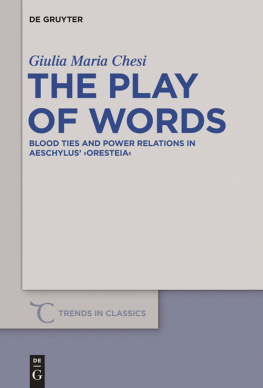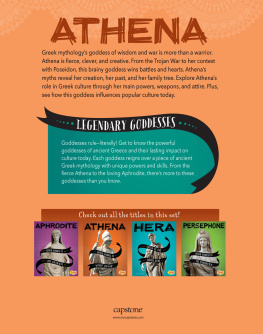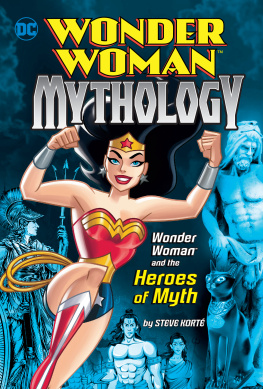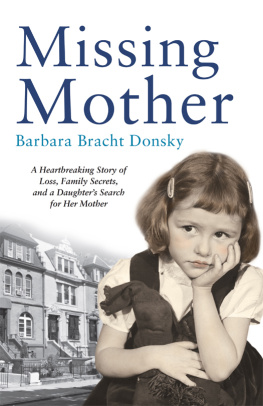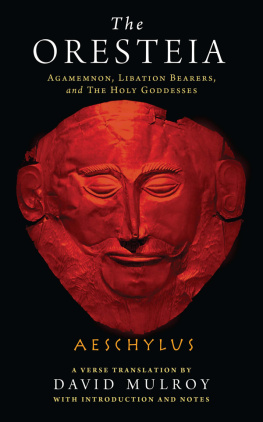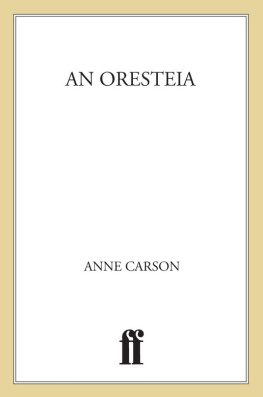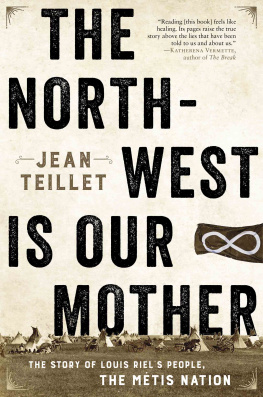COLUMBIA UNIVERSITY PRESS
Publishers Since 1893
New York Chichester, West Sussex
cup.columbia.edu
Copyright 2007 Columbia University Press
All rights reserved
E-ISBN 978-0-231-51205-3
Library of Congress Cataloging-in-Publication Data
Jacobs, Amber.
On matricide : myth, psychoanalysis, and the law of the mother / Amber Jacobs.
p. cm.
Includes bibliographical references and index.
ISBN 978-0-231-14154-3 (cloth : alk. paper)ISBN 978-0-231-51205-3 (electronic)
1. ParricidePsychological aspects. 2. Parricide in literature. I. Title.
HV6542.J33 2008
150.195dc22
2006036864
A Columbia University Press E-book.
CUP would be pleased to hear about your reading experience with this e-book at .
References to Internet Web sites (URLs) were accurate at the time of writing. Neither the author nor Columbia University Press is responsible for URLs that may have expired or changed since the manuscript was prepared.
T HEORIZING MATRICIDE, IN my argument, means making a feminist intervention into classical psychoanalysis via structural anthropology.
I argue that matricide, unlike patricide is untheorized in psychoanalysis. What this means is that there is no place within psychoanalytic theory for a maternal subject position that could function as a site of structuring power leading to a mode of symbolization that does not refer automatically to the paternal law. The key question with which I am concerned is whether the mother can be theorized within the terms of the underlying cultural laws that determine sociosymbolic organization.
The most ambitious aim of this book is to contribute to the creation of a symbolic organization that would counter the situation whereby femininity assumes its status as the limit of representation. My position is based on the feminist hypothesis that the present organization of the dominant symbolic order is not inevitable.
My specific strategy of sociosymbolic intervention will be through contemporary reworkings of ancient Greek mythology and tragedy. Ultimately, I pursue an analysis of the complex intersection of myth, phantasy, and culture and offer a strategy of feminist intervention into the dominant current Western symbolic organization through identifying what I will term the (re)structuring power of myth.
My rereading of ancient mythology and tragedy in this context aims to develop new insights and interventions into current psychosocial realities. In this way, I am not concerned with what Aeschylus, Sophocles, and Euripides meant but with how they have been or might be read, used, and interpreted today.
These rereadings of Greek mythology in contemporary terms enable me to interpret the unconscious phantasies that remain operative in our present sociosymbolic organization. Specifically, I use a rereading of the matricidal myth of the Oresteia, as dramatized by Aeschylus, Sophocles, and Euripides to question the status of matricidal phantasies within the terms of the underlying human laws that inform and determine our contemporary dominant symbolic organization and discourses.
Looking back to myth is part of a strategy that aims to modify our existing sociosymbolic organization. Using Greek myth in what I term its restructuring capacity is my specific strategy for combating the present symbolic hegemony that feminist theorists have persistently diagnosed.
Considering myth in terms of its structuring power requires addressing the question of its role with regard to the transgenerational unconscious transmission of sociocultural bonds. I am concerned with cultural receptions of mythology: how it has been and may be used today with respect to the question of sociosymbolic reorganization. Psychoanalysis is an exemplary instance of the recycling of Greek myth in contemporary discourse. I suggest that psychoanalytic feminism needs to address the implications of this particular mythical inheritance if it is to be able to intervene into psychoanalysis for the purpose of working toward the theorization of unconscious structures that are not reducible to the structure of Oedipus alone.
I work from translations of the Greek tragedies. In analyzing myth and tragedy, I do not concentrate on the language of the plays. I am not undertaking a materialist reading of ancient texts but rather am following Lvi-Strauss in adopting a structural approach; I am concerned with the processes by which myths operate in peoples minds without their being aware of the fact. More precisely, I want to address the question of using myth as an instrument to establish a new order of values within the thinking process itself. In this sense, working in translation is not an intellectual or methodological problem since I concentrate on cultural receptions of myth in the present and in the future, rather than on what the ancient Greek dramatists might have meant in the context in which they wrote.
The key conceptual operation underlying my argument is to use myth in order to theorize an underlying cultural law that is not reducible to the structure of Oedipus. In this way, one can begin to posit the possibilities of other fields of desire and meaning and their symbolic representation. Such a position takes as its premise an understanding of the symbolic that differs from Lacans. Rather than holding to the Lacanian view of the symbolic as static and monolithic, the post-Lacanian position espoused here considers the symbolic as a dynamic order that can be expanded and reorganized to accommodate different economies of desire and meaning. Rethinking the definition of the symbolic in this way introduces the possibility of including femininities as active participants in the symbolic network and arriving at an understanding that proposes a dynamic heterogeneous symbolic with openings allowing for potential reorganization and transformation.
What is in question is a symbolic economy that does not solely refer, in the first instance, to the paternal symbolic function but instead resurrects the mother from the so-called imaginary, presymbolic primitive realm and places her within the social arena of language, representation, and history. Such a move immediately upsets and destabilizes the structure of the oedipal phallic paradigm through which patriarchal power relations are secured. As soon as the symbolic function is dislodged from its automatic reference to the father as the third element functioning to break up the mother-infant imaginary dyad and thus creating a position from which to think and speak, the armatures of a new theorization concerning symbolic sexed subjectivities are necessarily suggested.
In summary, the backbone of my argument comprises three interrelated aims: first, to postulate a nonmonolithic theory of the symbolic; second, to theorize a maternal subject position that would lead to a reformulation of the crucial differentiating function of the symbolic; and, third, to bring matricide into theory as a structural concept.
M Y DEEPEST GRATITUDE to Margaret Whitford, who provided invaluable and inspiring intellectual engagement and support during the process of researching and writing this book. For important discussions about this work I want to thank Ulele Burnham, Helen Carr, Matt Cook, Sara Flanders, Susanna Jacobs, Vicky Lebeau, Allegra Madgewick, Juliet Mitchell, Vincent Quinn, Nick Royle, Naomi Salaman, Alan Sinfield, and Estela Welldon.


